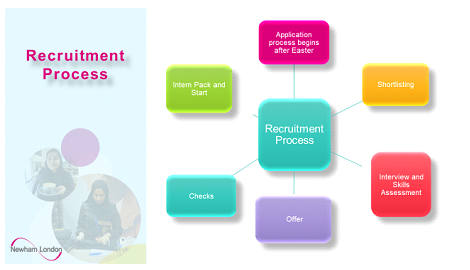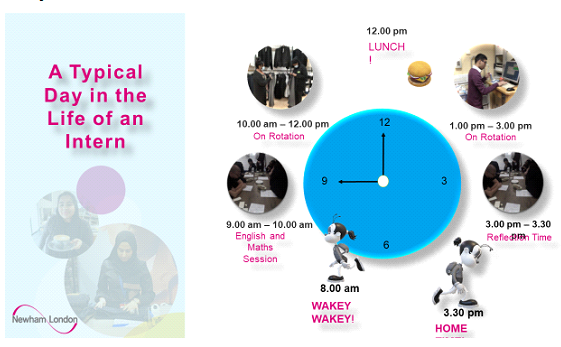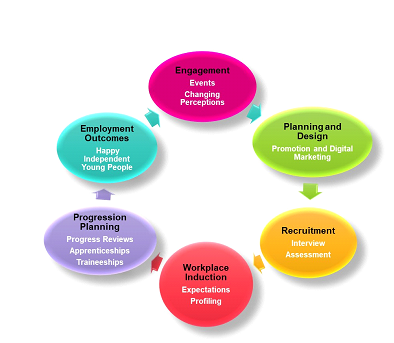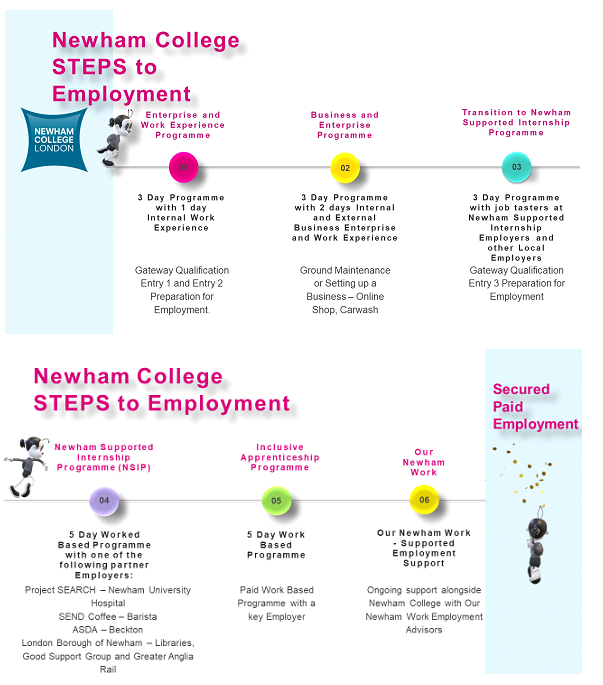
More than 65% of learners with Special Educational Needs and Disabilities (SEND) and learners with learning difficulties, want to progress into full time employment. With the national average of SEND learners in the UK gaining sustained, paid employment being at 5.6%, how can educators help their learners achieve their goals when “exclusive” education puts such heavy emphasis on theoretical, academic programmes?
Why does inclusion for SEND learners matters so much to me personally? I also want to explore a specific model – Newham Supported Internship Programme (NSIP) and how it has a transformational impact on SEND learners’ experience of education and their prospects for paid employment, within the London Borough of Newham.
My Personal Story
Growing up in Northern Ireland during the “troubles” in the 70’s and 80’’s, with the Army on the streets would seem quite daunting for young people today and even more so, the very apparent segregation and exclusion that was seen everywhere back then, in society. From the location you lived in, to life on the streets, to the school bus, to the schools. Remnants of this carry on to this day which has resulted in higher levels of unemployment and poverty compared to the rest of the UK.
All schools in Northern Ireland were segregated by religion. The Protestant Schools and Catholic Schools never mixed, except when on the school bus and even then, the Catholics would sit at the back of the bus and the Protestants would sit at the front. This, at times, caused a lot of mind distraction even before getting to school, as there would often be fights on the bus.
Generally, there was a very strong “left to get on with it” attitude within schools with little or no support for those that had disabilities, learning difficulties, medical conditions and those that struggled to fit in, because they thought “differently” than the mainstream academic students. With Northern Ireland’s long-standing history and combination of segregation in the religious, political and social arena, growing up there as a young person, with a very troubled home life, was always a struggle and a “conflict”. Schooling for me was not a place of real-life learning and allowing me to think for myself, but rather a place of being told what to think and ostracised and deemed “thick” when I didn’t agree or understand.
Rebellious and disruptive
During my time in school, I was never seen as an achiever within the academic system, even though I was an outgoing and creative child with potential. Instead, I was viewed as being rebellious, disruptive and difficult. Someone with “learning difficulties” and “behavioural issues” who couldn’t make sense of what I was being “told” about the world around me and having to conform to other people’s opinions of what they “wanted me to know” that was restrictive and in direct conflict of my experiences. I was unable to be an individual and express what I felt deep down inside because of my troubled home life, the segregated environment and the exclusive education system I was in. I felt I had to conform to the “hive” mind, so that I could fit in and be accepted.
I wasn’t academically minded, interested or able to concentrate for too long because my focus was being “directed” by others outside of myself. I was made to repeat year 7 as I failed all my exams. I was then put into the low-level form class away from the more able kids without any support, always being told I was stupid and would never amount to much by my teachers and others. As a result, I became the “clown” and made people laugh instead.
Acting the “edjit” (as we say in Ireland) developed my charisma, popularity (not with teachers!) and strengthened my character. Naturally as a result, I barely scraped through my exams at sixteen with two ‘O’ levels (equivalent to two GCSE’s). After repeating my Maths exam four times and my English twice at a technical college, I gained four O’Levels.
Sustaining employment was a struggle in my younger years. I was fired from my first seven jobs because I didn’t understand work ethics and had not been taught any real-life skills, employability skills or how to survive independently.
When I came to London at eighteen, I had to earn a living to pay rent and bills. I experienced many hard knocks, debt, getting in trouble with the law and barely surviving on the breadline. It was only then that I started to understand the importance of employment, having career aspirations, being self-sufficient and independent. So, I decided to change my attitude towards employment, money and attitude to life because my lack of confidence was holding me back.
After working in a variety of private/public jobs and being self-employed, I found myself ironically, in the Education sector, through a random agency job.
‘My career began to take off’
That was when I started to find my niche and when my career, over time, took off. I supported other “troubled teenagers” like myself, into vocational studies. I then went into special education needs and disabilities (SEND). I could relate to them so much, in their feelings of not “fitting in” within the parameters of the exclusive education system. I had a good rapport with a lot of these teenagers and still have to this day. Supporting them, helping them get ready for the world of work and drawing on my many seemingly failed employment and life experiences was what in the end, rather than qualifications, became my strength in giving them hope for their future.
When I was a School Links Coordinator at West London College, I was also asked to coordinate the recruitment of Supported Internship programme in 2016. I worked on the recruitment for Project SEARCH Hilton Hotel Heathrow Terminal 5, L’Oréal/Hammersmith and Fulham Council and Kensington High Street/Kensington Town Hall Supported Internship programmes. I was part of an award-winning team at the West London Business Awards in 2019 – with 70% employment outcomes against the national average of 5.6%.
In August 2020, for the first time, I applied for a management position at Newham College and was successful. I became the Manager of Newham College’s Supported Internship Programme within a very challenging borough in London. Newham is one of the poorest Boroughs in the UK with an extremely high unemployment rate and so I decided that I would take the challenge, push the boat out and really try to help change perceptions and make a difference through Inclusive education.
Even though I am not a “qualified” teacher, I now lead and manage a highly skilled college team of Tutors and Job Coaches to deliver a very different and “alternative” kind of education service for learners with Special Educational Needs and Disabilities (SEND), learning difficulties, behavioral issues and health conditions. Along with our partners, we build on the lntern’s needs and development through targets and outcomes from their Education, Health and Care Plans (EHCP’s). Drawing on their ambition and aspirations, we help develop their character, self-esteem, confidence, independence and engagement in the world beyond academic education into sustained paid employment.
What is a Supported Internship?
- Supported Internships were introduced by the Government as part of preparing youths for adulthood for the best possible outcomes in Employment, Independent Living, Health and Well Being and Community Participation (Children’s and Families Act 2014)
- One-year unpaid work-based learning programme for young people with Special Educational Needs and Disabilities (SEND), learning difficulties and health conditions, aged 16-24 with an Education, Health and Care Plan (EHCP)
- Direct and Practical Work Experience entirely at an Employer’s premises in 3 Job Rotations over one year along with College Tutor and Job Coach Support
- Business led collaboration with key partners in Local Authorities, Local Employers, Education Providers and Supported Employment Teams focusing on a holistic approach to planning and success
- Flexible job matching in line with Young person’s desires and assessed needs
- Stretch and Challenge work related skills and ethics as well as personal and social skills set, including English and Maths
- Ongoing Employment Support after the Supported Internship Programme is over
Benefits
When everyone works together and contributes towards the end common goal of sustained paid employment then everyone benefits, including the intern who receives on the job training and gains independence, confidence, aspirations and sustained paid employed. This automatically improves mental health and wellbeing. It also means as an education provider that we meet Department for Education guidelines. The employer also benefits by a strengthened workforce with low risk and no cost and so together we all contribute to the regeneration of the local community.
The Newham Supported Internship Programme (NSIP)
- We are one of the Largest Providers of Supported Internships in the UK.
- Each year around 40 -50 interns participate on a full year programme with 5 major employers, working in the borough of Newham.
- To date some 150 interns have joined and completed the programme, and each year interns are successful in securing continued employment, with Project SEARCH and John Lewis outcomes at over 50%
- We have a dynamic partnership led by Newham College and the London Borough of Newham Supported Employment Team (Our Newham Work), and our Host Businesses, including some of the most significant employers working within the borough
- Our Host Businesses are Bart’s NHS Trust based at Newham University Hospital – (Project SEARCH), Asda Beckton, SEND Coffee across 9 coffee shop sites, London Borough of Newham, Greater Anglia Trains, John Lewis and Waitrose
- Each partner brings unique skills, experiences and opportunities to the internship due to being specialists in their sectors
- The Partnership gives us greater potential, with resources being drawn from many places ‘many hands make light work’
- Partnership Support with regular Planning and Strategic Meetings
- We are inclusive to all types of disabilities on the programme
- We prepare Pre-Entry level learners and support the transition into a Supported Internship 3 years before progressing on a Supported Internship.
- Due to Covid 19 and working remotely, we had to be creative. The Interns on one of our Internships embarked on setting up a business online. They are now in the process of opening their first online shop.
- We are inclusive of 25yr olds to 30yr olds without an Education Health and Care Plan which is funded by the Commissioner of Adult and Social Care
- We have embarked on the Duke of Edinburgh Award which is linked through the Newham Youth Participation Services to provide extra support in skills and wellbeing.
How the NSIP works in practice
Recruitment
We work very closely with the London Borough of Newham’s Supported Employment Team (Our Newham Work) and Generate Opportunities, to find the right candidates for this programme. The criteria is designed to meet applicants’ wants and include:
The Recruitment Process

How we support interns on the Supported Internship Programme
- Intern Support – Tutors provided by Newham College, Job Coaches provided by Generate Opportunities, Mentors and Buddies provided by Employers
- Ongoing Training from Our Newham Work with Mental Health, Keeping Safe Online, etc
- Ongoing Training from Generate with Employability Skills
- Follow on Support with Our Newham Work
- Employer Support with regular Steering Group Meetings
- Parental Support with regular contact with Tutors, Job Coaches and Parent Forums
- British Association of Supported Employment (BASE) Support
Newham College
Newham College provides the education aspect of the programme, with tutor support for Maths and English and Employability Skills for one hour a day before rotations. The tutor also supports in rotations alongside job coaches. As well as providing college job coaches to support the Newham Supported Internship Program, we also provide employer liaison for all the SEND work experience related programmes at Newham College, pre NSIP.
Generate Opportunities
Generate is commissioned to provide us with highly skilled Job Coaches and to support in funding through Access to Work. The employers assign work” buddies” in their organisations to be mentors for the Interns and help job coaches learn the tasks before the job coaches guide the Interns through systematic training.
London Borough of Newham’s Supported Employment Team – Our Newham Work
Post Internship – Support When Looking for Work:
- Identifying ambitions, learning needs and individual skills to advise on suitable types of jobs
- Exploring previous experience and job preferences
- CV preparation – help creating/ amending a CV, completing applications etc.
- Support during the recruitment & selection process and assistance to improve interview techniques
- Employer Liaison – liaising with appropriate employers, to secure a range of vacancies
- Sourcing employment opportunities tailored to candidates’ individual needs and preferences
- Coaching/motivation
- Support When in Work:
- In-Work Job Coach Support when Interns secure employment or a work placement to help them stay employed (including support to tackle problems at work)
- Support with work related training
- Support to apply for Access to Work Grant once Interns get a job, including ongoing support to ensure Interns can travel to work safely
- Negotiating reasonable adjustments within the workplace
- Understanding in-work benefits and tax credits
A day in the life

Measuring success

Measuring success is one of our key performance indicators and helps us towards our end goal of employment outcomes for the young person with SEND and Learning difficulties
STEPS to employment

We recognize that not all our learners are ready to take on a full year, full time programme without some preparatory support. We have therefore designed a suite of support at Newham College, backed by recognized qualifications, to help students become ready for a full supported internship.
Progression
Progression after the Supported Internship is complete, is either job searching with Our Newham Work, the Kickstart Programme (6 months paid employment) or onto an Inclusive Apprenticeship where they will “earn as they learn”
Challenges
During Covid 19 lockdown, working remotely has had its challenges for Interns, tutors and job coaches, especially in regard to Interns engagement and their mental health. Two things that have been a great success for us and the Interns during lockdown was the setting up of the Duke of Edinburgh Award which we have started as a pilot scheme. The Interns will complete the bronze award where they attach their employability skills and physical activity, including walking and travel training.
As already mentioned, our other measure of success has been setting up an online shop; the Interns on the London Borough of Newham Programme are in the process of doing this. This is helping them develop website skills, marketing skills and learning how to set up a business of their own online.
Further Future Goals
Future Employment improvements I would like to see include considering the interview process – young people with SEND as well as those without, can find this a daunting experience especially the need to “perform” and “tick boxes” in the half hour interview. If employers started looking into alternative methods like work trials, based on the practicality of Supported Internship Programmes, they could gain a strengthened workforce and increase staff retention.
I would also like to see “tech” companies, that are currently expanding, give employment opportunities to young people with SEND. Some young people, especially with Autism are whiz kids in the tech world. The future seems to be moving this way, so tech companies would absolutely benefit in employing young people with alternative thinking processes.
Conclusion
Life is all about challenges, but also about overcoming them, as I know myself! inclusive education is about thinking outside of the box and beyond, in the Supported Internship Programmes. These can be “life changing and are a fantastic opportunity to bridge the gap from an inclusive education system through to employment and independence. I am very proud to be part of the Newham College and London Borough of Newham partnership team to deliver a relevant, progressive programme to support young people succeed in their lives.
Angie Hincks manages the Newham Supported Internship Programme (NSIP) at Newham College of Further Education.
Register for free
No Credit Card required
- Register for free
- Free TeachingTimes Report every month